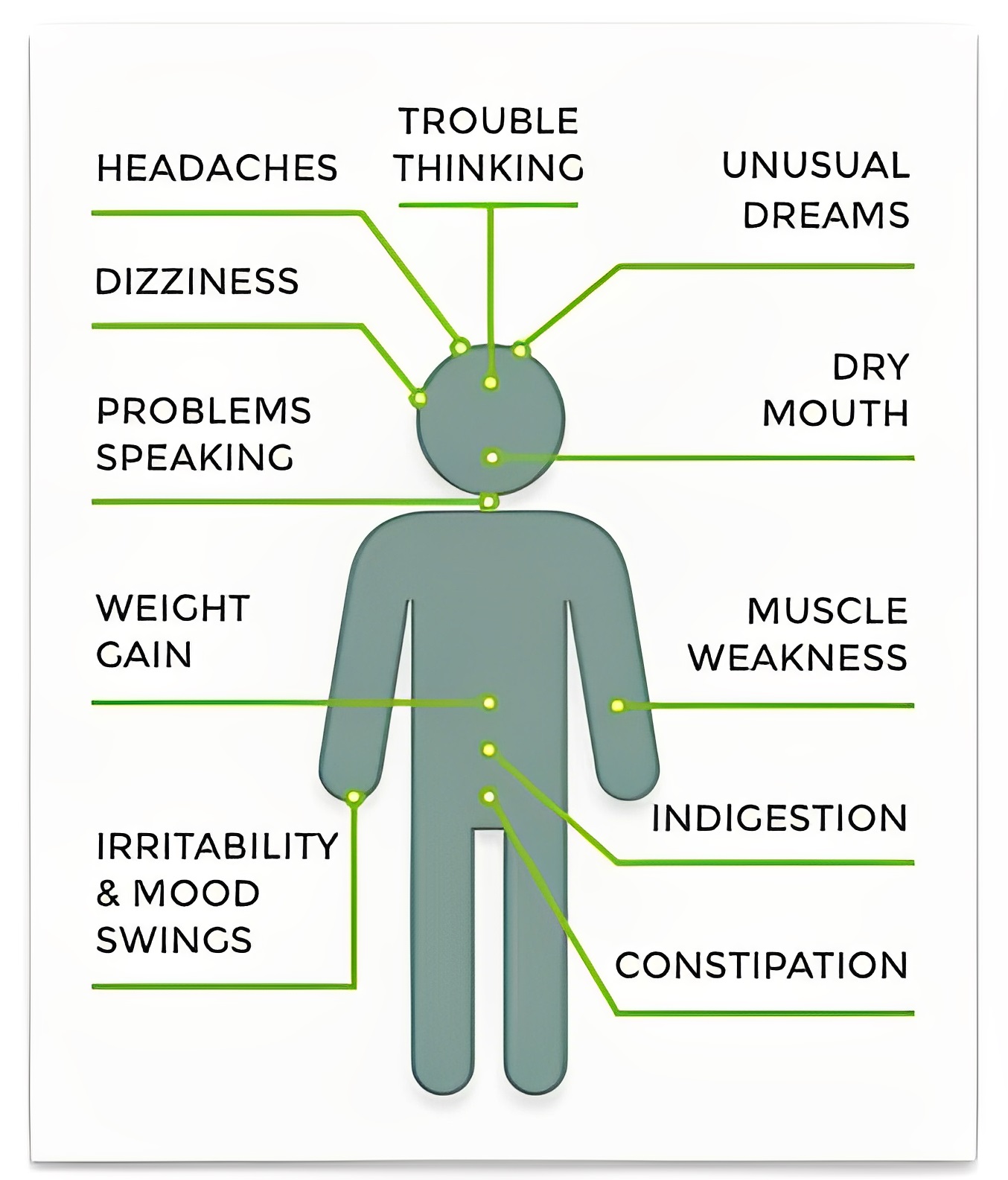Nursing educators often recommend integrating RN NCLEX Questions into daily study routines to reinforce key concepts and improve retention.
NCLEX Antipsychotic Drugs Questions - NCLEX Questions on Antipsychotic Drugs
Antipsychotic Drugs NCLEX Practice Questions
Question 1.
A patient with bipolar disorder has been prescribed lithium as a mood stabilizer. The patient is currently pregnant and has been drinking coffee and tea regularly.
What should the nurse consider when administering lithium to this patient?
(a) Administering diuretics to help with dehydration
(b) Advising the patient to drink plenty of water
(c) Administering electrolytes to prevent hyponatremia
(d) All of the above
Answer:
(b) Advising the patient to drink plenty of water
Explanation:
The correct option is (b) Advising the patient to drink plenty of water. This is the best course of action for the nurse to take in this situation because it addresses both the potential harm to the fetus from the lithium and the potential for lithium toxicity due to dehydration and diuretic use. By advising the patient to drink plenty of water, the nurse can help to prevent dehydration and potentially reduce the risk of lithium toxicity.
Additionally, the nurse should inform the patient and the caretakers about the potential side effects of lithium, including numbness and tingling in the skin, as well as the importance of seeking medical attention if these or any other adverse reactions occur.
Rationale:
Option (a) Administering diuretics to help with dehydration is incorrect because diuretics can cause serious hypovolemia and dehydration in patients taking lithium.
Option (c) Administering electrolytes to prevent hyponatremia is incorrect because hyponatremia is a potential side effect of lithium, but it is not the main concern in this case. The main concent is the potential hann to the fetus from the lithium and the potential for lithium toxicity due to dehydration and diuretic use.
Option (d) All of the above is incorrect because it includes options (a) and (c). which are both incorrect.
Question 2.
Which of the following is NOT a nursing consideration for patients taking lithium for bipolar disorder?
(a) Advising patients to take plenty of water to cure dehydration effects
(b) Advising patients to take electrolytes
(c) Administering lithium to pregnant women
(d) Avoiding the use of diuretics
Answer:
(c) Administering lithium to pregnant women
Explanation:
Lithium is an antipsychotic drug used to treat or control the manic episodes of bipolar disorder. However, it is important for nurses to be aware of the potential side effects and considerations when administering this medication. One of the important considerations is that lithium is teratogenic and should never be given to pregnant women. This is because it can cause disturbance in the growth of the growing fetus or baby.
Additionally, lithium can cause hyponatremia, which is a serious lack of sodium in the body. In response to this, the body may try to throw out water to maintain the balance of osmotic equilibrium, leading to hypovolemia and dehydration. Therefore, it is important for nurses to avoid the use of diuretics in patients taking lithium.
Other side effects of lithium may include numbness and tingling in the skin, as well as lethargy and drowsiness. It is important for nurses to advise patients and caretakers about these potential side effects and provide necessary interventions, such as electrolytes and plenty of water, to manage them.
Rationale:
Option (a) Advising patients to take plenty of water to cure dehydration effects is correct because dehydration and diuretics can cause lithium toxicity. Option (b) Advising patients to take electrolytes is correct because lithium can cause hyponatremia, which can be treated with electrolytes.
Option (c) Administering lithium to pregnant women is incorrect because lithium is teratogenic and can cause disturbance in the growth of the growing fetus or baby. Option (d) Avoiding the use of diuretics is correct because diuretics can cause serious hypovolemia and dehydration in patients taking lithium.
Question 3.
Which of the following is a common side effect of typical antipsychotics like Haloperidol?
(a) Catatonia
(b) Anhedonia
(c) Extrapyramidal symptoms
(d) Constipation
Answer:
C) Extrapyramidal symptoms
Rationale:
Typical antipsychotics like Haloperidol can cause extrapyramidal symptoms such as inability to sit still, involuntary muscle contraction, tremors, stiff muscles or muscles rigidity, and involuntary facial movements. Option (c) is the only option that matches this description, making it the correct answer.
Explanation:
Option (a) Catatonia involves lack of movement and communication, and can also include agitation, confusion, and restlessness. It is a symptom that can be treated with atypical antipsychotics, not typical antipsychotics like Haloperidol.
Option (b) Anhedonia refers to the inability to feel pleasure in normally pleasurable activities. It is also a symptom that can be treated with atypical antipsychotics. not typical antipsychotics like Haloperidol.
Option (d) Constipation is a common side effect of both typical and atypical antipsychotics. Therefore, it is not the correct answer.

Question 4.
Mrs. Ranjan is a 65-year-old woman who has been diagnosed with schizophrenia. Her healthcare provider has prescribed an antipsychotic medication to manage her symptoms. Which type of antipsychotic medication is most appropriate for Mrs. Ranjan?
(a) Haloperidol
(b) Chlorpromazine
(c) Olanzapine
(d) Quetiapine
Answer:
(a) Haloperidol
Rationale:
Haloperidol is a typical antipsychotic that is often used to treat schizophrenia and other psychotic disorders. It is a first- generation antipsychotic (FGA) or typical antipsychotic, meaning that it is an older medication that is less likely to cause side effects than newer atypical antipsychotics. Therefore, it may be a good choice for Mrs. Ranjan, especially if she has severe psychotic symptoms that require strong medication.
Option (a) (Haloperidol) is the correct answer because it is a typical antipsychotic that is often used to treat schizophrenia and other psychotic disorders. Option (b) (Chlorpromazine) is a typical antipsychotic, but it is not specifically a good choice for Mrs. Ranjan's condition.
Option (c) (Olanzapine) is an atypical antipsychotic that is less likely to cause side effects, but it may not be as effective as a typical antipsychotic in treating severe psychotic symptoms like hallucinations or delusions. Option (d) (Quetiapine) is also an atypical antipsychotic, but it is not a good choice for Mrs. Ranjan's condition.
Question 5.
Which of the following is a common side effect of typical antipsychotic medications like Haloperidol?
(a) Blurring of vision
(b) Drowsiness
(c) Constipation
(d) Extrapyramidal symptoms
Answer:
(d) Extrapyramidal symptoms
Explanation:
It is important for healthcare professionals to be aware of the potential side effects of antipsychotic medications, as they can significantly impact a patient's quality of life and overall treatment plan. While atypical antipsychotic medications may be preferred due to their lower risk of side effects, typical antipsychotics may still be necessary for certain patients, particularly those experiencing severe psychotic symptoms like hallucinations or delusions.
It is important for healthcare professionals to carefully evaluate the risks and benefits of both types of antipsychotics and to discuss potential side effects with their patients in order to make informed treatment decisions.
Rationale:
Option (a), blurring of vision, and option (b), drowsiness, are both listed as side effects of atypical antipsychotic medications. Option (c), constipation, is not a side effect of either typical or atypical antipsychotic medications. Therefore, the only option that accurately reflects the side effects of typical antipsychotic medications is option (d), extrapyramidal symptoms.
